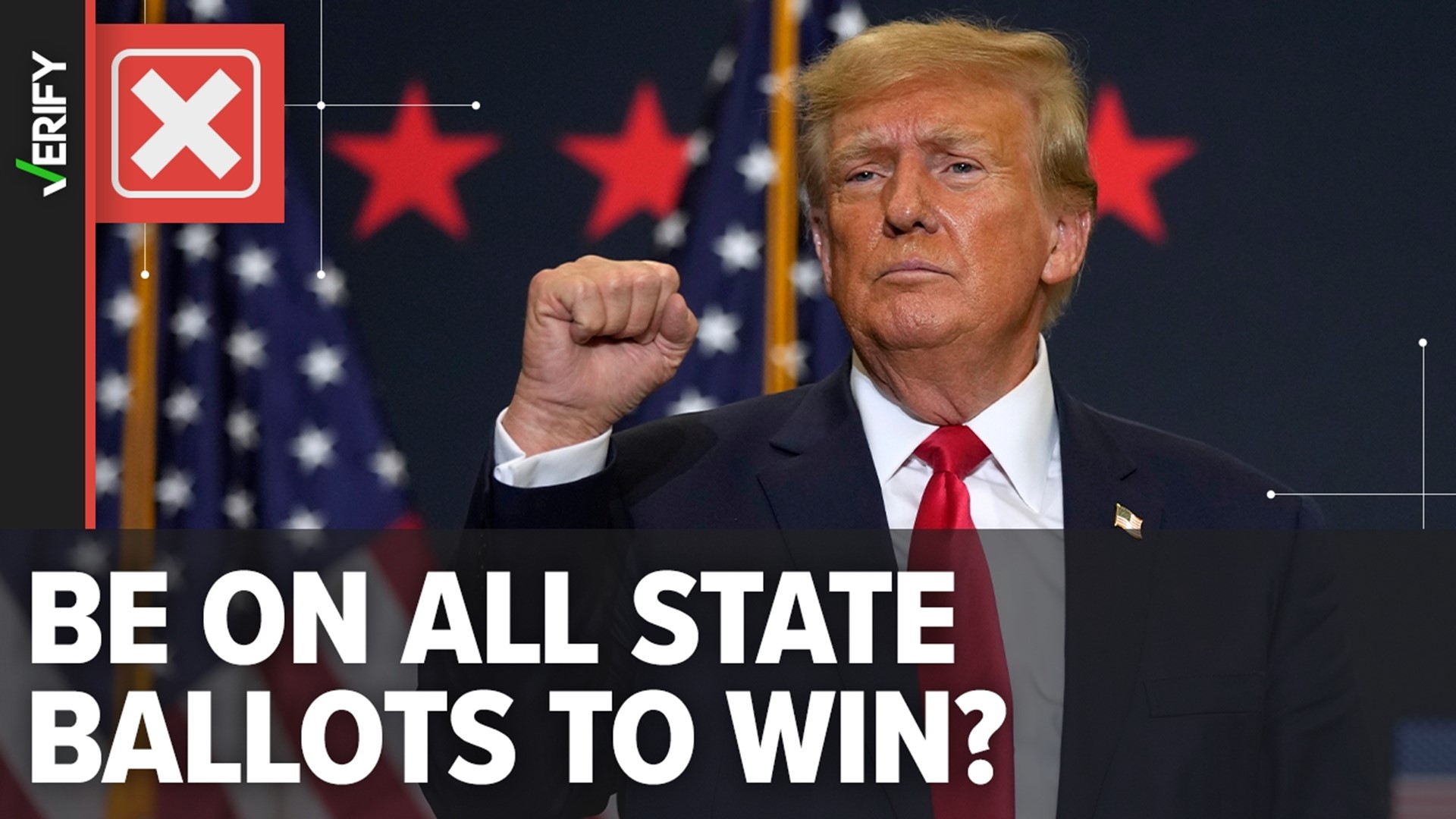UPDATE (3/4/2024): The Supreme Court on March 4 unanimously restored Donald Trump to 2024 presidential primary ballots, rejecting state attempts to ban the Republican former president over the Capitol riot. The story continues as originally published below:
The Supreme Court said on Friday, Jan. 5 that it will decide whether former President Donald Trump can be kept off the ballot over efforts to overturn his 2020 election loss.
The court agreed to take Trump's appeal of a case from Colorado that removed him from the state's primary ballot under Section 3 of the 14th Amendment, a provision known as the “insurrection clause.”
Trump is separately appealing a ruling by Maine Secretary of State Shenna Bellows to remove him from the ballot under the insurrection clause.
Arguments in the Supreme Court case will be held in early February 2024.
VERIFY reader Beth asked if a candidate has to appear on the ballot in every state to be elected president, in the event that Trump is ultimately removed from ballots in Maine and Colorado.
THE QUESTION
Does a candidate have to appear on all state ballots to be elected president?
THE SOURCES
- U.S. Constitution
- U.S. National Archives and Records Administration
- USA.gov, the official guide to government information and services
- National Association of Secretaries of State (NASS)
- Federal Election Commission
- Ballotpedia, a digital encyclopedia of American politics and elections
- Patrick Gannon, public information director at the North Carolina State Board of Elections (NCSBE)
- Eric Herberlig, Ph.D., professor of political science at the University of North Carolina at Charlotte
THE ANSWER
No, a candidate does not have to appear on all state ballots to be elected president.
WHAT WE FOUND
A presidential candidate does not have to appear on the ballot in every state to be elected, according to our sources. That’s because the Electoral College ultimately decides who will be elected president of the United States.
“Ballot access laws vary by state, but since the president is determined by the number of Electoral College votes received, a candidate doesn’t have to appear on every state’s ballot to win, as long as the candidate receives at least 270 electoral votes,” the National Association of Secretaries of State (NASS) told VERIFY.
In state and local elections, candidates are elected directly by popular vote, USA.gov says on its website. But for the presidential election, the president and vice president are not directly elected by citizens. Instead, they are chosen by “electors” through a process called the Electoral College.
The Electoral College consists of 538 electors from all 50 states and the District of Columbia, according to the National Archives. Electoral votes are allocated to the states based on the census.
Each state gets as many electors as it has members of Congress in the House of Representatives and Senate, according to USA.gov. A candidate needs the vote of at least 270 electors — more than half of all electors — to be elected president.
That means if former President Trump were to be removed from the ballot in a few states, he'd still be eligible to win the 270 votes needed of the remaining 503 electoral college votes available.
The groups attempting to remove Trump from the ballot are citing Section 3 of the 14th Amendment, which has been deemed the “insurrection clause,” that dates back to the Civil War. The intent of the clause was to prevent former leaders of the Confederacy, who engaged in rebellion against the U.S., from holding office. It reads:
“No person shall be a Senator or Representative in Congress, or elector of President and Vice-President, or hold any office, civil or military, under the United States, or under any State, who, having previously taken an oath, as a member of Congress, or as an officer of the United States, or as a member of any State legislature, or as an executive or judicial officer of any State, to support the Constitution of the United States, shall have engaged in insurrection or rebellion against the same, or given aid or comfort to the enemies thereof. But Congress may, by a vote of two-thirds of each House, remove such disability.”
In other words, elected officials who betray their oath and rebel against America are banned from ever holding public office again. The clause has only been used a handful of times since it was ratified in 1868, but never against a president.
Multiple lawsuits that cite the “insurrection clause” have been filed to keep Trump off the ballot. But legal experts previously told VERIFY the Supreme Court would likely have to rule on whether the clause could even be applied to presidents and determine whether Trump engaged in the insurrection before it could be invoked.
“What we are seeing now is challenges in individual states, and that's because states have their own ballot access laws,” Eric Herberlig, a political science professor at the University of North Carolina at Charlotte, said. “They decide what processes candidates have to go through to get on the ballot.”
Ballot access laws are a “variety of complex, state-specific filing requirements and deadlines” that “determine whether a candidate or party will appear on an election ballot,” according to Ballotpedia. The Federal Election Commission says “ballot access is controlled by each state according to state law, even for federal elections.”
Ballotpedia says there are three basic methods by which a person may become a candidate for president: they could seek the nomination of a political party, run as an independent or run as a write-in candidate.
“A presidential candidate must prepare to meet ballot access requirements well in advance of primaries, caucuses and the general election,” Ballotpedia explains.
The Associated Press contributed to this report.

